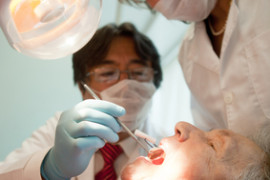Can antibodies be a predictor of future cognitive decline and Alzheimer’s disease? In a recent study published in PLoS One, researchers at Boston University set out to determine just that.
In the case-control study, which included 269 adults, researchers tested for antibodies to common oral pathogens associated with periodontal disease and dental caries:
“High antibody levels to C. rectus were found in 69% of the participants, followed by 63% to T. forsythia, 53% to T. denticola, 23% to P. gingivalis, 19% to E. nodatum, 11% to A. actinomycetemcomitans and 10% to A. naeslundii. “
Interestingly, those with high levels of antibodies to A. naeslundii—a bacterium associated with early dental plaque formation, gingivitis, and dental caries—had a significantly increased risk of developing Alzheimer’s disease.
As the study authors mentioned, there is already an established connection between antibodies to periodontal infection and cardiovascular events. The immune response and subsequent inflammatory cascade is known to contribute to risk for a host of inflammatory diseases, so it is not a stretch to see that this immune response might also affect risk for Alzheimer’s disease, which has an inflammatory component and has already been linked to cognitive decline.
Previous studies have shown that serum antibodies to P. gingivalis are associated with cognitive decline in adults over age 60, and a 2013 study found that oral inflammation was a significant predictor of cognitive decline. Periodontal pathogens are capable of translocating to the brain, and earlier this year, we learned that elderly people with periodontal disease are more likely to have amyloid beta accumulation in the brain.
Is the final cure of Alzheimer’s disease in the dental chair? Probably not. Alzheimer’s disease is an extremely complex disease with many factors. But addressing the impact of oral biofilm on the immune response and ensuing cognitive decline seems to be a proactive way to reduce the risk of Alzheimer’s disease.
Source: Serum IgG antibody levels to periodontal microbiota are associated with incident Alzheimer disease.



